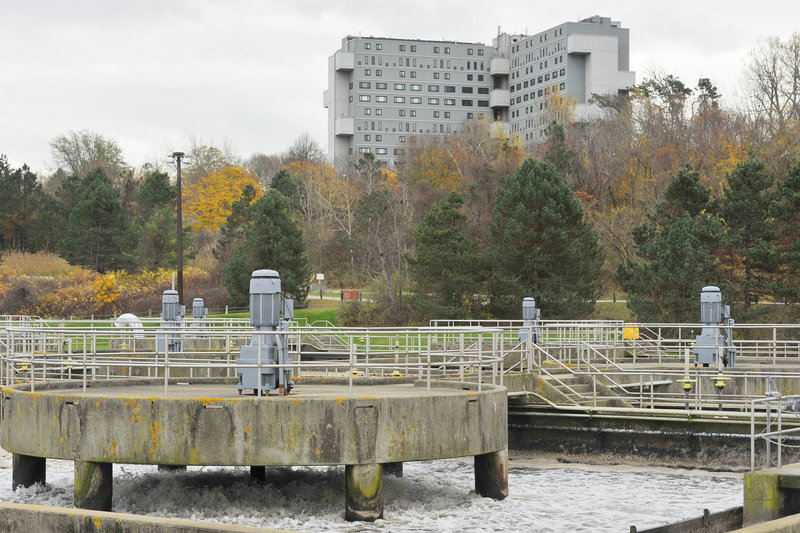PORTLAND – A spike in odor complaints has prompted the Portland Water District to look for ways to control smells from the East End Treatment Plant that periodically permeate Munjoy Hill.
About a dozen residents, most of whom live in a high-rise condominium on the East End, met with Mayor Michael Brennan and water district officials on Oct. 23.
The residents asked the water district to study the performance of odor-control systems, implement an odor control plan and establish a hotline for complaints.
A wastewater odor expert says the plant has more odor controlling systems than most treatment plants in the U.S., but residents and water district officials say this summer seemed particularly bad for odors.
The water district noticed an increase in complaints in September, said Scott Firmin, director of wastewater services.
One of the people who met with the city and water district officials is Crandall Toothaker, co-owner of C+T Property Management, which owns about 185 units in the city, including 25 on the East End.
Tyson Wilkins, the rental manager for Portland Maine Rentals, a division of C+T Property Management, said he gets periodic complaints about smells, especially from people who are renting apartments for the summer.
“We do hear from our tenants that sometimes they can smell it,” Wilkins said.
“This summer was more than any other.”
Wilkins, who lives on Munjoy Hill, said he and his neighbors are also concerned about health effects on students at the East End Community School.
“With the school being right there, probably the major concern is the children,” he said.
Bob Bowker, a national wastewater odor expert, said no health risks are associated with the odor.
The levels of chemicals used in the treatment process are so low, they are difficult to measure.
“Unfortunately, the human nose can detect very low concentrations,” he said.
Other residents who attended the meeting did not return calls or emails for comment.
The building manager at the Promenade Towers condos said residents were trying to deal with the issue quietly so it didn’t end up in the paper.
An agenda provided by the water district notes that the meeting was intended to be a “non-public, responsible and discreet” discussion.
Andrea Myhaver, president of the Munjoy Hill Neighborhood Organization, said it was “a little frustrating” that the mayor and City Hall didn’t invite her group to discuss what is, at times, an unbearable odor.
“I have to say it’s pretty grim,” said Myhaver, whose son attends the East End school.
“There are many mornings and afternoons when I drop him off and pick him up, it’s just gross. There’s no other way to put it.”
The district does not formally track complaints, but Firmin estimated that it received about a half-dozen in September.
It typically receives one or two a month.
Firmin said residents complained of not being able to sleep with their windows open at night.
The hot, humid, windless days and nights of August are typically the smelliest times of year.
The water district hired Bowker & Associates of Portland, a nationally recognized firm that specializes in wastewater odor, to do an assessment of the treatment plant in October to identify potential odor sources.
Spokeswoman Michelle Clements said the firm was paid less than $10,000 for the study.
Firmin said the tests have been done and the firm is drafting its preliminary recommendations, which will be presented to residents next week.
The firm noted that a $2.5 million air scrubber that was installed 10 years ago is still in excellent condition but a second air scrubber could be improved.
In the coming weeks, Firmin said, the water district will introduce a more formal process for tracking odor complaints.
People now call or send emails, but they don’t give enough information for workers to trace the problem.
An online form is being created to ask for the day, time and weather conditions when odors are detected.
“We do want to understand what odors, and when those odors are experienced, so we can figure out what’s causing them,” Firmin said.
The plant will also draft an odor-control plan, so it can easily communicate its efforts to the neighborhood, he said.
Bowker, owner of Bowker & Associates, said three primary odors are associated with phases of treating wastewater.
Raw sewage can typically smell like rotten eggs, he said, while wastewater going through the clarification process can have a “musty, earthy odor.”
A strong sulphur odor can be produced in the processing of residual material — or the sludge of pollutants.
The $2.5 million system for removing odor is working as well as it did when it was put in, Bowker said. The dual-stage system treats the smelly air twice, removing 99 percent of the stench.
An air scrubber that treats odor during the second — and smelliest — half of processing is not working as well, he said. That air scrubber is used for the sludge.
“Out of all the odor sources, sludge-handling was one of the strongest,” Bowker said.
The $2.5 million air scrubber was part of a $7.6 million overhaul of the plant to capture and control odors.
The project included building domes over raw-sewage holding tanks.
Bowker, who has consulted with treatment plants throughout the United States, said the East End Treatment Plant has better odor controlling systems than 90 percent of the plants he has seen.
“That’s one of the things that’s so frustrating — to hear there has been this rash of odor complaints over the summer,” said Bowker, who in 25 years has never encountered an odor-free treatment plant.
Firmin said the district is willing to make investments to reduce smells, but there is no guarantee that the plant will ever be odor-free.
Staff Writer Randy Billings can be contacted at 791-6346 or at:
rbillings@mainetoday.com
Twitter: @randybillings
Send questions/comments to the editors.



